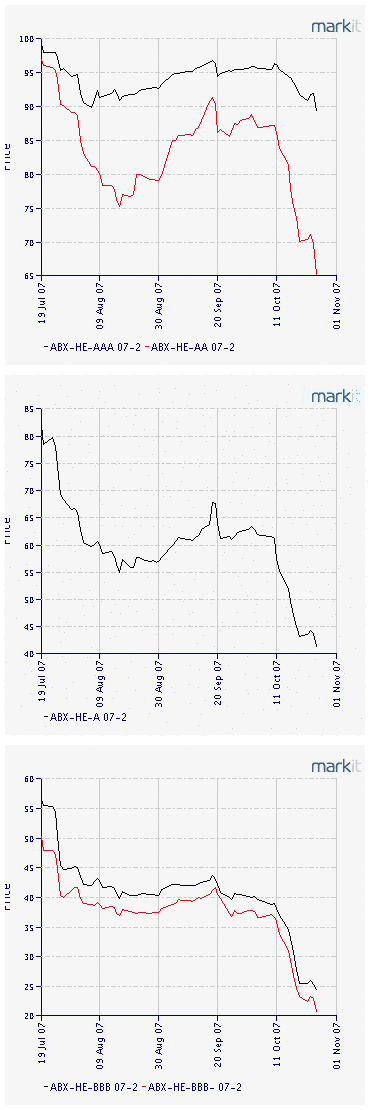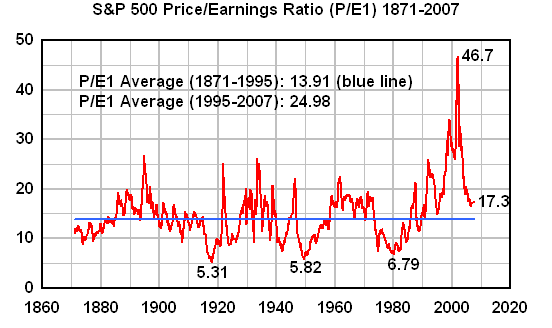
Dynamics

|
Generational Dynamics |
| Forecasting America's Destiny ... and the World's | |
| HOME WEB LOG COUNTRY WIKI COMMENT FORUM DOWNLOADS ABOUT | |
On a day when the Bank of England warned investors that the stock market is "particularly vulnerable," the ABX-HE index continued to fall like a stone, indicating that the market values of CDOs in many institutions' portfolios are continuing to fall as well.
 |
This came on the day when the Bank of England issued the semi-annual Financial Stability Report. The report said that the global financial system is at risk of further instability because of "ongoing uncertainties" about credit-market losses, and that both the stock market and commercial real estate values are particularly vulnerable to "further shocks, either in credit markets or from new sources." The gloomy outlook was confirmed in testimony by Chancellor of the Exchequer Alistair Darling.
None of this affected investors, of course. Speaking from the floor of the New York Stock Exchange, CNBC commentator Bob Pisani said that "investors are obsessed with a Fed rate cut next week. That's all they think about. That's all that matters to them."
The ABX-HE indexes are a measure of investor confidence that homeowners are not going to default on their mortgages. The three graphs shown above reflect mortgages that were granted this year, from January 1 to July 1, 2007. The top level graph represents the highest quality prime mortgages, with rating AAA or AA; the middle level graph represents medium risk Alt-A mortgages, with rating A; and the bottom graph represents highest risk subprime mortgages. Indexes at all levels are falling like rocks, and may be headed to zero.
The ABX indexes are proxies for the "market values" of mortgage-backed CDOs in the portfolios of Merrill Lynch and other financial institutions.
Who knows? Maybe one of the reasons that Merrill had to write down $7.9 billion in CDO values, instead of the $4.5 billion they had told us just two weeks ago, is because the ABX indexes fell sharply in the interim.
I like to look at trends, so let's take a look at the trends that have gotten us to the current place:
At that time, mainstream financial reporters and pundits were saying that problems from the housing bubble were "contained," and that the only firms affected would be mortgage lending institutions, like HSBC and Century.
At that time, mainstream financial reporters and pundits were saying that the problems were "contained" to just a few companies in the business of funds based on mortgage-back securities.
The problems were also pretty much in the past, according to the financial reporters and pundits, because they were based on subprime mortgages loans that had been given out in 2005 and 2006. Soon all those problems would be taken care of.
At that time, mainstream financial reporters and pundits were still saying that the problems were "contained" by mortgage loans that had been granted in 2006. Standards had gotten stiffer in 2007, we were told.
At that time, mainstream financial reporters and pundits were saying that the credit crunch had disappeared, and that investor confidence had been restored. This was a return to the height of the "bad news is good news" mentality of investors, where any bit of bad news meant that the Fed would lower interest rates further, and so bad news was good news.
This was the BEST news of all!!!! Investors were calling the third quarter the "kitchen sink" quarter, because all these firms were going to write off everything they could, so that by Q4 they could be expanding the bubble again.
What really became apparent was this: The mortgage crisis was not "contained" by mortgage loans granted in 2005-2006; the mortgage loans granted in 2007 were just as bad as the ones issued in 2006. Also, the mortgage crisis was not "contained" to subprime mortgage loans; CDOs at all risk levels were affected.
Still, mainstream financial reporters and pundits were reassuring us that financial institutions were getting all of this settled now, writing things down, so that they could start fresh in Q4.
I wanted to give this summary just to show that the mainstream financial media and pundits will always put the best spin on things. They are, in effect, biased in the direction of keeping the bubble growing as long as possible, even though the larger the bubble, the greater the disaster when it finally bursts completely.
The continued collapse of the ABX index values is really bad news, because it means that the CDOs and other securities in the portfolios of financial institutions are becoming more and more worthless every day.
CNBC commentator David Faber made an interesting point on Thursday. He said that "Merrill Lynch wrote down its high-grade CDOs by 19%, and its [low-grade] CDOs-Squared by 57%." He then compared this to what a small investment firm, Ambex has done. "By contrast, the mark-to-market losses announced by Ambex on its CDO portfolio, which is made up of exactly the same stuff that Merrill had in its portfolio, stand at 2½%."
Faber's comment makes it clear that Ambex has a long way to go in writing down the values of its securities, and by implication so does almost everyone else. Even Merrill, in making its announcement on Wednesday, said that it might have further writedowns on the same securities.
How long can these firms keep this up? How long can they hide the fact that their CDOs are worth far less than they're telling us? How long can they resort to SIVs and M-LECs and Super-SIVs that allow banks to sell worthless securities to each other at inflated prices in order to establish a phony "market value" for the worthless securities?
My instincts tell me that this can't possibly go on much longer, but let's face it, my timing instincts haven't always been the best. But at some point there'll be a "tipping point" and a panic, when it becomes clear that the global financial system is built on top of these near-worthless securities. This panic might occur next week or next month or even next year, but I just can see how it can be prevented much longer.
Let's just review what we do know.
As I showed in my article, "How to compute the 'real value' of the stock market," the stock market is overpriced by a factor of 250%, same as in 1929.
One of the graphs from that article is the following:
 |
Now, no one in his right mind can look at this graph and not see immediately that the stock market is going to crash. The P/E ratio will drop below 10, as it did in 1982, for example, and the stock market will fall to Dow 4000 or lower.
From the point of view of Generational Dynamics, we're headed for a
generational panic and crash with 100% certainly.
(26-Oct-07)
Permanent Link
Receive daily World View columns by e-mail
Donate to Generational Dynamics via PayPal
Web Log Summary - 2016
Web Log Summary - 2015
Web Log Summary - 2014
Web Log Summary - 2013
Web Log Summary - 2012
Web Log Summary - 2011
Web Log Summary - 2010
Web Log Summary - 2009
Web Log Summary - 2008
Web Log Summary - 2007
Web Log Summary - 2006
Web Log Summary - 2005
Web Log Summary - 2004
Web Log - December, 2016
Web Log - November, 2016
Web Log - October, 2016
Web Log - September, 2016
Web Log - August, 2016
Web Log - July, 2016
Web Log - June, 2016
Web Log - May, 2016
Web Log - April, 2016
Web Log - March, 2016
Web Log - February, 2016
Web Log - January, 2016
Web Log - December, 2015
Web Log - November, 2015
Web Log - October, 2015
Web Log - September, 2015
Web Log - August, 2015
Web Log - July, 2015
Web Log - June, 2015
Web Log - May, 2015
Web Log - April, 2015
Web Log - March, 2015
Web Log - February, 2015
Web Log - January, 2015
Web Log - December, 2014
Web Log - November, 2014
Web Log - October, 2014
Web Log - September, 2014
Web Log - August, 2014
Web Log - July, 2014
Web Log - June, 2014
Web Log - May, 2014
Web Log - April, 2014
Web Log - March, 2014
Web Log - February, 2014
Web Log - January, 2014
Web Log - December, 2013
Web Log - November, 2013
Web Log - October, 2013
Web Log - September, 2013
Web Log - August, 2013
Web Log - July, 2013
Web Log - June, 2013
Web Log - May, 2013
Web Log - April, 2013
Web Log - March, 2013
Web Log - February, 2013
Web Log - January, 2013
Web Log - December, 2012
Web Log - November, 2012
Web Log - October, 2012
Web Log - September, 2012
Web Log - August, 2012
Web Log - July, 2012
Web Log - June, 2012
Web Log - May, 2012
Web Log - April, 2012
Web Log - March, 2012
Web Log - February, 2012
Web Log - January, 2012
Web Log - December, 2011
Web Log - November, 2011
Web Log - October, 2011
Web Log - September, 2011
Web Log - August, 2011
Web Log - July, 2011
Web Log - June, 2011
Web Log - May, 2011
Web Log - April, 2011
Web Log - March, 2011
Web Log - February, 2011
Web Log - January, 2011
Web Log - December, 2010
Web Log - November, 2010
Web Log - October, 2010
Web Log - September, 2010
Web Log - August, 2010
Web Log - July, 2010
Web Log - June, 2010
Web Log - May, 2010
Web Log - April, 2010
Web Log - March, 2010
Web Log - February, 2010
Web Log - January, 2010
Web Log - December, 2009
Web Log - November, 2009
Web Log - October, 2009
Web Log - September, 2009
Web Log - August, 2009
Web Log - July, 2009
Web Log - June, 2009
Web Log - May, 2009
Web Log - April, 2009
Web Log - March, 2009
Web Log - February, 2009
Web Log - January, 2009
Web Log - December, 2008
Web Log - November, 2008
Web Log - October, 2008
Web Log - September, 2008
Web Log - August, 2008
Web Log - July, 2008
Web Log - June, 2008
Web Log - May, 2008
Web Log - April, 2008
Web Log - March, 2008
Web Log - February, 2008
Web Log - January, 2008
Web Log - December, 2007
Web Log - November, 2007
Web Log - October, 2007
Web Log - September, 2007
Web Log - August, 2007
Web Log - July, 2007
Web Log - June, 2007
Web Log - May, 2007
Web Log - April, 2007
Web Log - March, 2007
Web Log - February, 2007
Web Log - January, 2007
Web Log - December, 2006
Web Log - November, 2006
Web Log - October, 2006
Web Log - September, 2006
Web Log - August, 2006
Web Log - July, 2006
Web Log - June, 2006
Web Log - May, 2006
Web Log - April, 2006
Web Log - March, 2006
Web Log - February, 2006
Web Log - January, 2006
Web Log - December, 2005
Web Log - November, 2005
Web Log - October, 2005
Web Log - September, 2005
Web Log - August, 2005
Web Log - July, 2005
Web Log - June, 2005
Web Log - May, 2005
Web Log - April, 2005
Web Log - March, 2005
Web Log - February, 2005
Web Log - January, 2005
Web Log - December, 2004
Web Log - November, 2004
Web Log - October, 2004
Web Log - September, 2004
Web Log - August, 2004
Web Log - July, 2004
Web Log - June, 2004